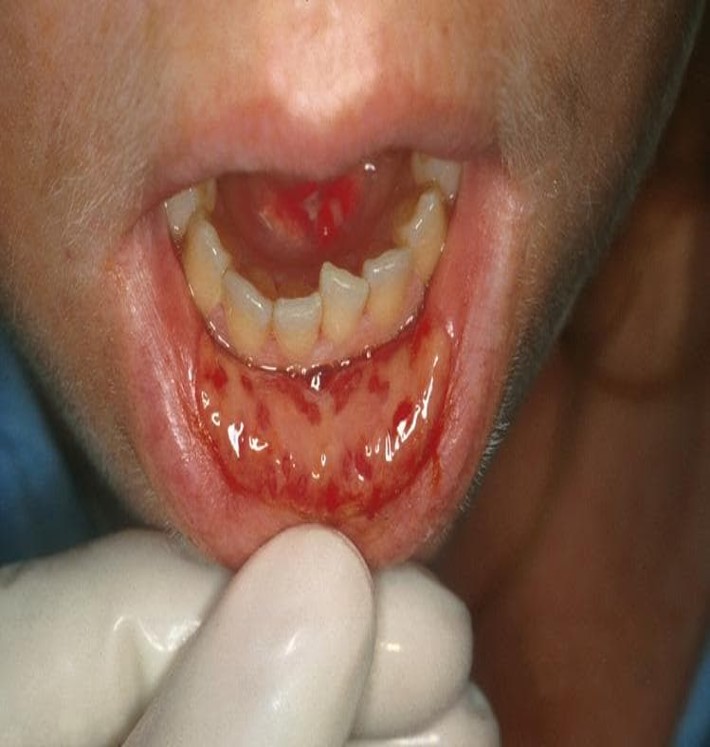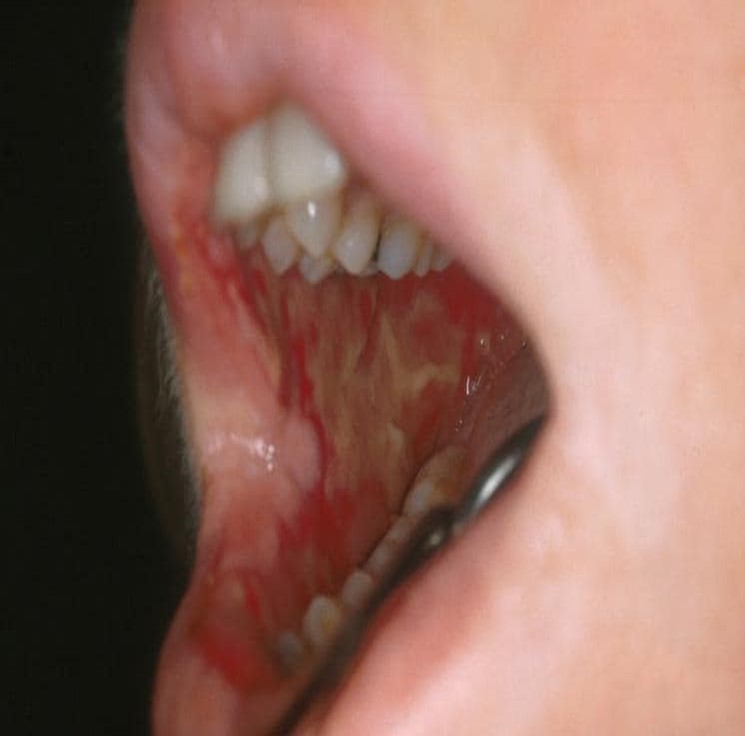Tuesday Poster Session
Category: Esophagus
P4972 - Toxicity Unveiled: The Critical Role of DPD Deficiency in 5-Fluorouracil Chemotherapy
Tuesday, October 28, 2025
10:30 AM - 4:00 PM PDT
Location: Exhibit Hall
.jpg)
Angelin Raju, MD (she/her/hers)
Texas Health Resources HEB/ Denton
Bedford, TX
Presenting Author(s)
Award: ACG Presidential Poster Award
Angelin Raju, MD1, Anish Jomy, MBBS2, Arthur CHIDI. Igbo, MD, MPH3, Gaurav Arora, MD1, Maher Taha, MD4, Samar Sumrain, 5, Scott Keeney, DO1
1Texas Health Resources HEB/ Denton, Bedford, TX; 2Methodist Health System, Richardson, TX; 3Texas Health Resources HEB/Denton Internal Medicine Program, Lewisville, TX; 4Texas Health Resources, Irving, TX; 5Texas health resources, Lewisville, TX
Introduction: Dihydropyrimidine dehydrogenase (DPD) deficiency is a rare but clinically significant genetic disorder that impairs the metabolism of 5-fluorouracil (5-FU), a cornerstone chemotherapeutic agent in gastrointestinal (GI) cancers. DPD normally inactivates 5-FU for safe excretion; deficiency can result in drug accumulation and potentially fatal toxicity. While most patients tolerate 5-FU, 10–40% experience grade ≥3 toxicities, primarily hematologic and gastrointestinal and 1% suffer fatal outcomes.
Case Description/
Methods: A 76-year-old female with a history of gastric banding, GERD, and Barrett’s esophagus was diagnosed with poorly differentiated esophageal adenocarcinoma during an diagnostic EGD for weight loss and anorexia. Imaging showed no metastasis, likely stage T2N0M0 and she began neoadjuvant FOLFOX chemotherapy (5-FU, leucovorin, oxaliplatin) in preparation for surgical resection. Ten days after the first cycle, she presented with generalized weakness and profuse diarrhea. Symptoms began on day three post-chemotherapy with severe mucositis, nausea, vomiting, and diarrhea. By day 11, she was in shock and required ICU care. She was found to have grade 4 mucositis, leukopenia (WBC 0.3 K/µL, ANC 0), and thrombocytopenia (platelets 25 K/µL). She was treated with vasopressors, G-CSF, transfusions, and broad-spectrum antibiotics. Infectious workup, including C. difficile and other enteric pathogens, was negative and sepsis was ultimately ruled out. Given the extreme toxicity after a single dose of 5-FU, DPD deficiency was suspected. Genetic testing confirmed heterozygosity for the non-functional DPYD*13 variant (activity score 1), indicating an intermediate metabolizer phenotype and increased risk for fluoropyrimidine toxicity. Her hospital course was further complicated by Hand-Foot-Mouth disease and a small bowel obstruction, both managed conservatively. She was discharged after 25 days. This case highlights the importance of DPD testing before 5-FU therapy.
Discussion: GI cancers make up 25% of U.S. cancer cases and 35% of related deaths. Fluoropyrimidines like 5-FU and capecitabine remain key treatments, but can cause severe toxicity in patients with DPD deficiency. While European countries mandate cost-effective DPYD testing, U.S. guidelines currently suggest only shared decision-making. DPYD testing is a simple blood test. Gastroenterologists, often first to diagnose GI cancers and manage related toxicities, are uniquely positioned to advocate for testing.

Figure: Grade 4 Mucositis

Figure: Grade 4 Mucositis
Disclosures:
Angelin Raju indicated no relevant financial relationships.
Anish Jomy indicated no relevant financial relationships.
Arthur Igbo indicated no relevant financial relationships.
Gaurav Arora: Eli Lilly – Advisory Committee/Board Member.
Maher Taha indicated no relevant financial relationships.
Samar Sumrain indicated no relevant financial relationships.
Scott Keeney indicated no relevant financial relationships.
Angelin Raju, MD1, Anish Jomy, MBBS2, Arthur CHIDI. Igbo, MD, MPH3, Gaurav Arora, MD1, Maher Taha, MD4, Samar Sumrain, 5, Scott Keeney, DO1. P4972 - Toxicity Unveiled: The Critical Role of DPD Deficiency in 5-Fluorouracil Chemotherapy, ACG 2025 Annual Scientific Meeting Abstracts. Phoenix, AZ: American College of Gastroenterology.
Angelin Raju, MD1, Anish Jomy, MBBS2, Arthur CHIDI. Igbo, MD, MPH3, Gaurav Arora, MD1, Maher Taha, MD4, Samar Sumrain, 5, Scott Keeney, DO1
1Texas Health Resources HEB/ Denton, Bedford, TX; 2Methodist Health System, Richardson, TX; 3Texas Health Resources HEB/Denton Internal Medicine Program, Lewisville, TX; 4Texas Health Resources, Irving, TX; 5Texas health resources, Lewisville, TX
Introduction: Dihydropyrimidine dehydrogenase (DPD) deficiency is a rare but clinically significant genetic disorder that impairs the metabolism of 5-fluorouracil (5-FU), a cornerstone chemotherapeutic agent in gastrointestinal (GI) cancers. DPD normally inactivates 5-FU for safe excretion; deficiency can result in drug accumulation and potentially fatal toxicity. While most patients tolerate 5-FU, 10–40% experience grade ≥3 toxicities, primarily hematologic and gastrointestinal and 1% suffer fatal outcomes.
Case Description/
Methods: A 76-year-old female with a history of gastric banding, GERD, and Barrett’s esophagus was diagnosed with poorly differentiated esophageal adenocarcinoma during an diagnostic EGD for weight loss and anorexia. Imaging showed no metastasis, likely stage T2N0M0 and she began neoadjuvant FOLFOX chemotherapy (5-FU, leucovorin, oxaliplatin) in preparation for surgical resection. Ten days after the first cycle, she presented with generalized weakness and profuse diarrhea. Symptoms began on day three post-chemotherapy with severe mucositis, nausea, vomiting, and diarrhea. By day 11, she was in shock and required ICU care. She was found to have grade 4 mucositis, leukopenia (WBC 0.3 K/µL, ANC 0), and thrombocytopenia (platelets 25 K/µL). She was treated with vasopressors, G-CSF, transfusions, and broad-spectrum antibiotics. Infectious workup, including C. difficile and other enteric pathogens, was negative and sepsis was ultimately ruled out. Given the extreme toxicity after a single dose of 5-FU, DPD deficiency was suspected. Genetic testing confirmed heterozygosity for the non-functional DPYD*13 variant (activity score 1), indicating an intermediate metabolizer phenotype and increased risk for fluoropyrimidine toxicity. Her hospital course was further complicated by Hand-Foot-Mouth disease and a small bowel obstruction, both managed conservatively. She was discharged after 25 days. This case highlights the importance of DPD testing before 5-FU therapy.
Discussion: GI cancers make up 25% of U.S. cancer cases and 35% of related deaths. Fluoropyrimidines like 5-FU and capecitabine remain key treatments, but can cause severe toxicity in patients with DPD deficiency. While European countries mandate cost-effective DPYD testing, U.S. guidelines currently suggest only shared decision-making. DPYD testing is a simple blood test. Gastroenterologists, often first to diagnose GI cancers and manage related toxicities, are uniquely positioned to advocate for testing.

Figure: Grade 4 Mucositis

Figure: Grade 4 Mucositis
Disclosures:
Angelin Raju indicated no relevant financial relationships.
Anish Jomy indicated no relevant financial relationships.
Arthur Igbo indicated no relevant financial relationships.
Gaurav Arora: Eli Lilly – Advisory Committee/Board Member.
Maher Taha indicated no relevant financial relationships.
Samar Sumrain indicated no relevant financial relationships.
Scott Keeney indicated no relevant financial relationships.
Angelin Raju, MD1, Anish Jomy, MBBS2, Arthur CHIDI. Igbo, MD, MPH3, Gaurav Arora, MD1, Maher Taha, MD4, Samar Sumrain, 5, Scott Keeney, DO1. P4972 - Toxicity Unveiled: The Critical Role of DPD Deficiency in 5-Fluorouracil Chemotherapy, ACG 2025 Annual Scientific Meeting Abstracts. Phoenix, AZ: American College of Gastroenterology.

